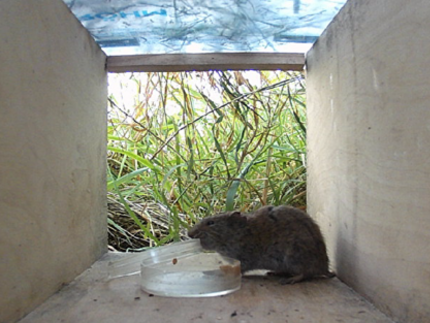Urban cognition
Characterizing traits that enable successful animals to thrive in urban habitats will help to illuminate the determinants of successful adaptation to human-induced rapid environmental change (HIREC; Sih et al., 2011), as well as allowing more effective mitigation strategies of the impact on anthropogenic destruction.
Innovation - the ability to produce new behaviours or to apply novel solutions to old problems (e.g. Kummer & Goodall, 1985; Reader & Laland, 2003) - has been proposed as a major predictor to the successful establishment and permanency in novel or altered habitats (e.g. Sol et al., 2002, 2013). Therefore, it might be a key trait in adapting to and persisting in urban landscapes (e.g. Ducatez et al., 2020; Sih, 2013; Sol, 2009).
In this ongoing project, we investigate among-individual variation in behavioural flexibility and innovation propensity in various small mammals species. Directly in the wild and on a completely voluntary basis.
Publications
Dammhahn M, Mazza V, Schirmer A, Göttsche C, Eccard JA. (2020) Of city and village mice: behavioural adjustments of striped field mice to urban environments. Scientific reports 2020 10(1):1-12. https://doi.org/10.1038/s41598-020-69998-6
Mazza V & Guenther A (2021) City mice and country mice: innovative problem-solving in rural and urban non-commensal rodents. Animal Behaviour 172(1). https://doi.org/10.1016/j.anbehav.2020.12.007
Mazza V, Czyperreck I, Eccard, J A & Dammhahn, M (2021) Cross-context responses to novelty in rural and urban small mammals. Frontiers in Ecology and Evolution 9:661971. https://doi.org/10.3389/fevo.2021.661971

